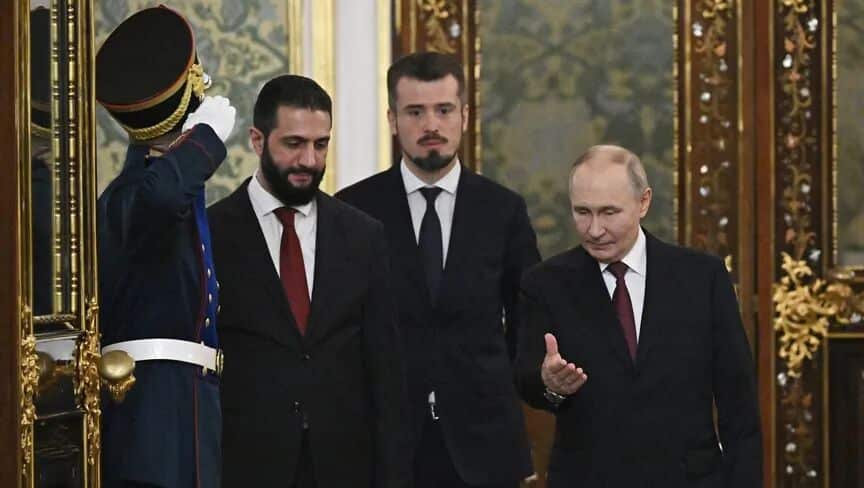Al-Sharq: Moscow keeps Damascus for itself to maintain military bases.
Russian President Vladimir Putin had an important meeting with Syrian interim government head Ahmed al-Sharaa in October. Some described Moscow’s invitation as a new page in which the Kremlin seeks to open its relations with the new Syria, but there are many questions about the nature and form of these relations; from possible new agreements to the fate of Bashar al-Assad (former Syrian president) and Russia’s role in reconstruction and how the country will cooperate with new agreements between Damascus and other capitals, especially Arab capitals.
According to the network, after the closed-door negotiations between Russian officials, details of the consultations and files in question were not disclosed, and there was no discussion of possible agreements with the current Syrian government.
Russia’s presence in Syria will decrease
Political analyst Elena Sobonina said in this regard: There is an urgent need to review old agreements, and some of them will continue. In the talks between Putin and Al-Shara, important areas of cooperation from oil and gas to tourism were discussed, and old and new projects between the two countries are on the table, but at the same time we know that Russia’s presence in Syria will decrease, and this is a new reality, and the economic and military presence will not be the same as before.
He added: The meeting between Putin and Al-Shara shows the desire of the parties to maintain and develop the current relations. The new Syrian government knows that it must have diverse foreign relations, and Moscow also understands that its continued presence in the Middle East requires a presence in Syria.
Moscow seeks to maintain influence in the Middle East through a military presence in Syria. Al-Sharq continued: Since the fall of the Bashar al-Assad regime, the fate of Russia’s military presence in Syria has occupied the world, and questions have arisen about Syria’s final decision in this regard. Now, after the high-level meeting, observers of the affairs consider Al-Shara’s words about adhering to previous agreements positive for Moscow, which is an emphasis on not losing its foothold in the Middle East through its presence in Syria.
Losing Russia’s position in the Mediterranean will be a disaster for Moscow
“Vasily Fatizarov”, a Russian expert and analyst, also said: “It is important to maintain Russia’s military bases in Syria, and losing Russia’s position in the Mediterranean will be a disaster for Moscow. For now, Al-Sharaa has spoken of adhering to agreements with Russia, and we believe it, but words alone are not enough, and we need to see what happens in practice.
He added, “The loss of bases in the Mediterranean is a disaster for Russia, but there are levers of pressure. The presence of military bases in Syria is very important for Russia, and our presence in the Mediterranean is also very important.”
Military bases are strategic
“Kirill Simonov”, another Russian expert, also said: “Russia is interested in maintaining its presence in the Middle East, and what is important is the strategic situation, including military bases, whose missions and functions can be changed, such as turning them into logistical centers to support operations in Africa.”
He stated: “At the same time, these bases are still strategic facilities that, if necessary, can be used for military purposes, such as fighting ISIS in the event of its resurgence.”
Simonov added, “This is also important for al-Sharaa in terms of balance within its country. We are seeing how external influences are reflected in Syria and he is trying to move forward in the interests of his people, relying on Russian support. Some countries, including Turkey, were surprised by al-Sharaa’s decision because they hoped that Russia would leave Syria. No one expected al-Sharaa to take these steps.
Russian desire to be present in southern Syria
Al-Sharq continued this report, referring to the developments in southern Syria and the Zionist regime’s “David Corridor”: The stance of Russian Foreign Minister Sergei Lavrov and the official condemnation of Israeli attacks on targets inside Syria indicate that Russia is seeking some kind of influence in southern Syria.
Russia’s presence hinders the implementation of the “David Corridor”
Vyacheslav Matuzov, a former Russian diplomat, said in this regard: The Russian government’s acceptance of the request to settle in southern Syria will hinder the implementation of Israel’s plans to implement the so-called ‘David Corridor”.
He added: “If we agree to al-Shara’s request, we will neutralize Israel’s plans to create the David Corridor in southern Syria up to the borders of Jordan and Iraq. We feel that we have a common language with al-Shara and are on the right path.”
The former diplomat continued: “Russian officials have not yet made a decision on this, but we should not forget that our presence in Syria is decreasing and Turkey’s presence as a NATO member is increasing.”
Turkey’s competition with Russia
On the other hand, Igor Yushkov, an energy analyst, referring to the discussion of economic cooperation between Russia and Syria, said about the reaction of the West: “I do not think that these countries will hinder Russia, but there is a question of competition with Turkey, which is seeking to export energy from Syria.”
Al-Sharq continued its article about Al-Shara’s request to the Russians to hand over Bashar al-Assad: Some in the West see the fall of Bashar al-Assad’s regime as a defeat for Moscow, and Russian analysts and experts have different views on the case of his handover to the Syrian authorities.
Fatijarov spoke of the lack of investigation into this issue, meaning that it was not addressed at all, and the discussion of handing over Assad was limited to the media before Al-Shara’s trip to Moscow, but “Sobonina” thinks that Al-Shara discussed handing over Assad with Russian officials behind closed doors.
Sobonina said, “I am sure that Al-Shara will address this issue and that Russia will not hand over Bashar al-Assad and his family because the issue is related to Putin’s principles and beliefs.”

